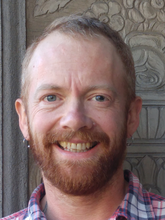415 Soil Science & Zoom
Phyto-remediation of arsenic in urban agricultural soils
Sustainable methods to remediate urban soils in advance of urban agriculture are of interest to community-based practitioners and researchers. Phytoextraction, the use of plants to remove contaminants from soil while leaving soil in place, is particularly attractive as a potentially low-cost, accessible, and sustainable remediation method. Arsenic phytoextraction with the arsenic-hyperaccumulating fern Pteris vittata could be used to decontaminate arsenic-contaminated agricultural soils. However, remediation rates in diverse soils and climates are not well constrained and often prohibitively slow. Working with community collaborators at a prospective community orchard in Berkeley, CA, we investigated effects of fertilizers on arsenic phytoextraction rates with P. vittata in a four-year field study. Building on this, we conducted a one-year high resolution field study and a meso-scale soil column study to investigate arsenic cycling and uptake processes in greater detail. We found that arsenic leaching from soil occurred during phytoextraction, and fern growth increased arsenic concentrations in leachate, apparently releasing byproduct arsenic through nutrient scavenging activities. Transpiration decreased the mass of arsenic leached. Arsenic leaching from soil could explain the arsenic deficit we observed under field conditions, where fern arsenic accumulation could only account for 39% of arsenic depletion from soil. We conclude that arsenic phytoextraction could increase environmental arsenic contamination depending on the fate of leached arsenic, and that overall, arsenic phytoextraction is not suitable for community-based soil remediation.

Dr. Sarick Matzen, Postdoctoral Associate, Department of Soil, Water, and Climate, University of Minnesota
Sarick Matzen is a postdoctoral geochemist in the Toner Lab. Sarick has long been interested in the toxic and dirty. He began his geochemistry career with nuclear waste disposal work at Lawrence Livermore National Lab as an undergrad. He made his way to community farming in California and Tennessee, and then to UC Berkeley where he got his PhD in 2020 in soil geochemistry working with Céline Pallud on arsenic phytoextraction. He has now landed in the Toner lab where he is taking a break from contaminants to work on the transport of iron nanoparticles in marine systems. Overall Sarick is interested in promoting healthy and sustainable systems, in soils and also in academic institutions through anti-oppressive practice in the sciences.
